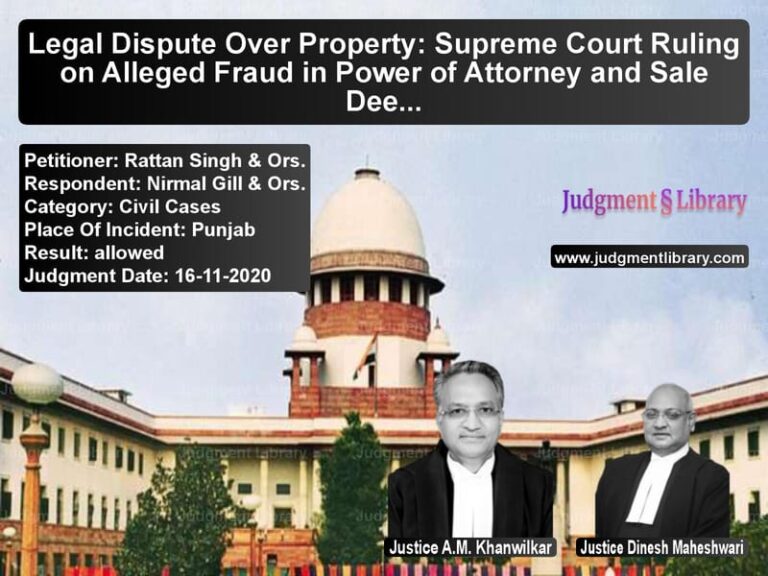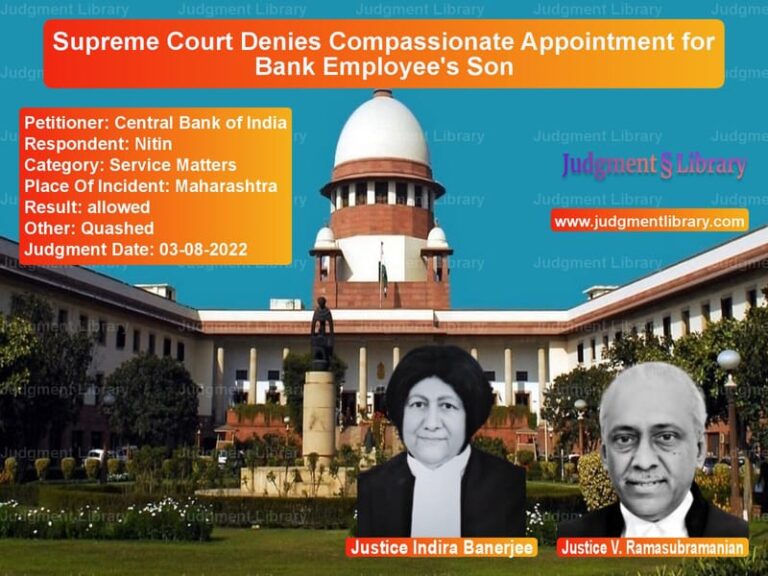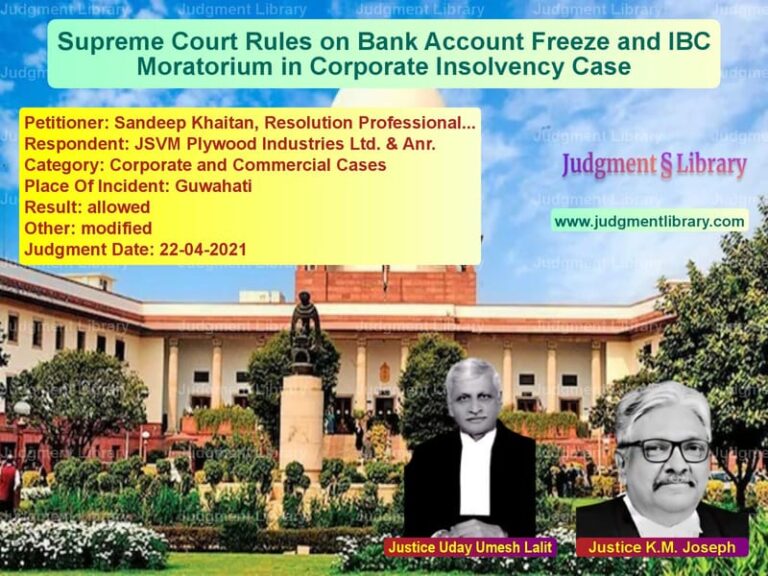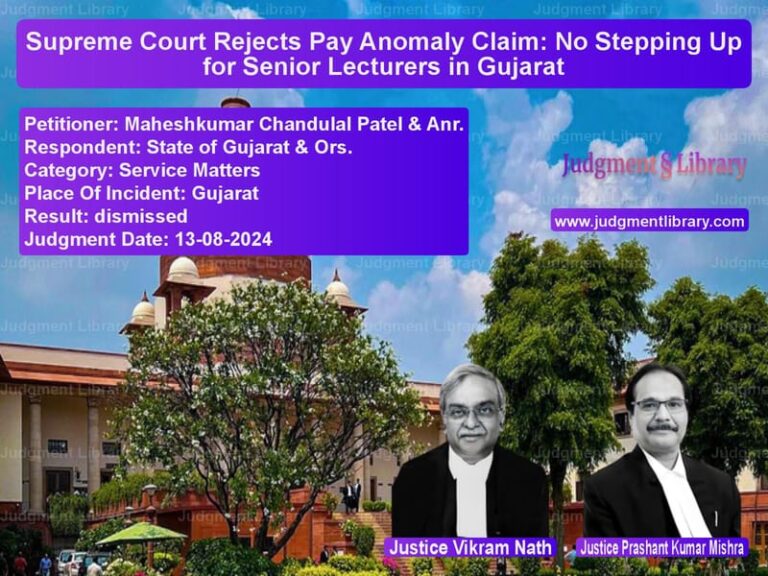TANGEDCO vs. CSEPDI-Trishe Consortium: Supreme Court Ruling on Tender Evaluation and Judicial Review
The case of Tamil Nadu Generation and Distribution Corporation Ltd. (TANGEDCO) vs. CSEPDI – Trishe Consortium is a significant legal battle concerning tender evaluation, procedural fairness, and the scope of judicial review in government contracts. This case delves into how courts should intervene in public procurement decisions and the limits of judicial scrutiny in highly technical financial assessments.
Background of the Case
The Tamil Nadu Generation and Distribution Corporation Ltd (TANGEDCO) floated a tender on May 6, 2013, for the establishment of two 660 MW Ennore SEZ Supercritical Thermal Power Project units in Chennai. Among the bidders, CSEPDI-Trishe Consortium and Bharat Heavy Electricals Ltd. (BHEL) were shortlisted for final consideration.
The tender process became contentious when CSEPDI-Trishe Consortium raised objections regarding the evaluation criteria and alleged favoritism toward BHEL. Their repeated representations to TANGEDCO were ignored, leading them to file a writ petition in the Madras High Court seeking judicial intervention in the bidding process.
Legal Issues Raised
The primary issues in the case revolved around:
- Whether TANGEDCO fairly evaluated the bids based on the prescribed criteria.
- The extent to which courts can intervene in tender decisions.
- The correctness of the financial consultant’s assessment of bid prices.
- Whether the refusal to consider representations before finalizing the tender violated procedural fairness.
Arguments by the Appellant (TANGEDCO & BHEL)
The appellants argued that:
- The tender process followed all procedural requirements.
- Judicial review should not extend to technical and financial evaluations.
- The financial consultant appointed was competent and followed the tender conditions.
- CSEPDI-Trishe’s bid was rightly rejected due to commitment fee issues and financing cost miscalculations.
Arguments by the Respondents (CSEPDI-Trishe Consortium)
The respondents contended that:
- TANGEDCO’s evaluation process was biased and arbitrary.
- The financial consultant erroneously added commitment fees and interest charges, making their bid appear higher.
- Their lower interest rates and overall bid price were not properly considered.
- The refusal to engage in post-bid discussions violated the principles of fairness and transparency.
High Court’s Decision
The Madras High Court’s Division Bench ruled in favor of CSEPDI-Trishe Consortium, holding that:
- TANGEDCO had acted arbitrarily by rejecting post-bid clarifications.
- The financial consultant’s report contained errors in bid evaluation.
- The failure to consider revised interest rates and commitment fees led to an unfair selection of BHEL as the lowest bidder.
- The tender decision should be reviewed, and the selection process should be redone fairly.
Supreme Court’s Judgment
The Supreme Court overturned the High Court’s decision, ruling in favor of TANGEDCO and BHEL. The court made key observations:
1. Limits of Judicial Review
The court emphasized that tender evaluation involves complex financial assessments best left to technical experts. It stated:
“The courts cannot sit in appeal over the financial consultant’s assessment. Suffice it to say, it is neither ex facie erroneous nor can we perceive it as flawed for being perverse or absurd.”
2. Role of the Financial Consultant
The Supreme Court upheld the consultant’s report, noting that:
- Bid evaluation involved numerous financial factors, including interest rates, debt structuring, and risk management.
- CSEPDI-Trishe’s bid included unclear commitment fees and financing charges, justifying their disqualification.
- Judicial intervention in such technical calculations was unwarranted.
3. Procedural Fairness
The court acknowledged that CSEPDI-Trishe had the right to raise objections but held that courts should not interfere mid-process. It stated:
“An aggrieved party can approach the court at the appropriate stage, not when bids are being considered.”
4. Final Ruling
The Supreme Court held that the High Court had exceeded its jurisdiction by acting as an appellate authority over financial calculations. The ruling concluded:
“In a complex fiscal evaluation, the court has to apply the doctrine of restraint. The financial computation, capacity, and feasibility of completion of the project have to be left to financial experts.”
The Supreme Court thus reinstated BHEL’s contract award and dismissed the appeal.
Key Takeaways
- Judicial review in tender cases is limited – Courts should not interfere in technical financial assessments unless there is clear evidence of mala fide action.
- Transparency in bidding processes is critical – While procedural fairness is necessary, post-bid representations should not unduly delay tender finalization.
- Government procurement decisions require expertise – Financial evaluations must be left to technical consultants and experts, not judicial scrutiny.
Conclusion
This ruling reinforces the principle that courts must exercise caution while intervening in tender evaluations, particularly when dealing with complex financial assessments. The Supreme Court’s decision ensures that technical evaluations remain in the hands of experts while upholding fairness and transparency in public procurement processes.
Don’t miss out on the full details! Download the complete judgment in PDF format below and gain valuable insights instantly!
Download Judgment: Tamil Nadu Generatio vs CSEPDI – Trishe Cons Supreme Court of India Judgment Dated 18-10-2016.pdf
Direct Downlaod Judgment: Direct downlaod this Judgment
See all petitions in Corporate Governance
See all petitions in Company Law
See all petitions in Contract Disputes
See all petitions in Judgment by Dipak Misra
See all petitions in Judgment by Shiva Kirti Singh
See all petitions in allowed
See all petitions in Quashed
See all petitions in supreme court of India judgments October 2016
See all petitions in 2016 judgments
See all posts in Corporate and Commercial Cases Category
See all allowed petitions in Corporate and Commercial Cases Category
See all Dismissed petitions in Corporate and Commercial Cases Category
See all partially allowed petitions in Corporate and Commercial Cases Category







